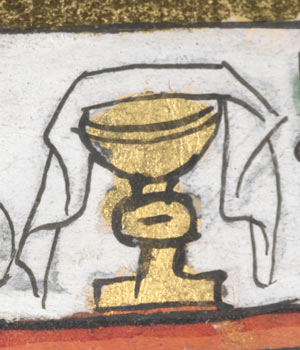 |
 |
 |
 |
 |
 |
 |
|
Early Problems (6/15) The abbacy of Alexander’s successor, Ralph Haget (1182-c. 1190), was dogged with problems. These related to the administration of the abbey’s estates and culminated in the loss of the abbey’s grange at Micklethwaite. This was Kirkstall’s greatest source of support and its loss had a devastating impact. In fact, the community was forced to disband for a short period and seek refuge at neighbouring Cistercian houses. Micklethwaite had been given to the monks by Earl Roger de Mowbray, but was lost when Roger’s relationship with the king soured. ‘Ill-advised by his counsellors,’ Henry II seized Roger’s estates at Bardsey and Collingham, and the monks subsequently lost their holdings at Micklethwaite. In an attempt to recover this land, Ralph sought to win the king’s favour and presented him with precious gifts which included a golden chalice and a manuscript of the Gospel. Unfortunately, Ralph’s efforts were in vain, and he was accused by some of the monks of sacrificing the abbey’s treasures. During the reign of King John (1199-1216), Abbot Helias recovered the community’s lands at Micklethwaite. However, this came at a high price: in return for their lands at Micklethwaite, the monks agreed to rent from the king the manors of Collingham and Bardsey, for the princely annual sum of £90. Ralph’s successor, Lambert (c. 1190-3) is credited with establishing peace and sufficiency at Kirkstall, but his abbacy was troubled with problems relating to the land at Cliviger and Accrington, near the Yorkshire / Lancashire border. When Richard de Elend pressed his claims for the monks’ grange of Cliviger – and he had strong grounds for doing so – Abbot Lambert yielded, and resigned the property into the hands of Kirkstall’s patron, Roger de Lacy. In return, the community received the park of Accrington. The abbot wished to convert the park to a grange and thus dispossessed the inhabitants here, but his actions incensed the local men who, ‘at the instigation of the Devil,’ burnt down the monks’ grange and furniture, and murdered three of the lay-brothers who managed the grange. Roger de Lacy was outraged by this violence and took measures to ensure that the offenders made satisfaction to the abbot for their crime. The grange was rebuilt and peace ostensibly restored, but the episode underlines the tumultuous side to monastic life.(8)
|

![Illuminated initial, showing flagellation[From the 'Omne Bonum' of Jacobus Anglicus]](../../images/C3614-08.jpg)